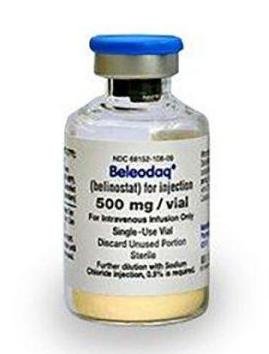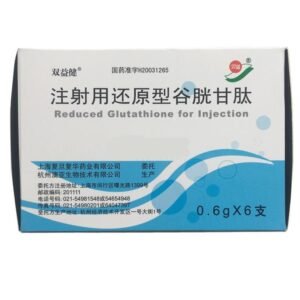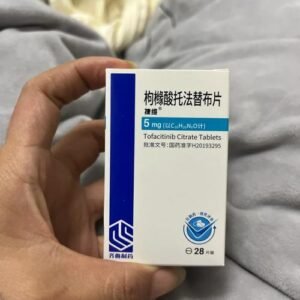BELEODAQ BELINOSTAT 贝利司他冻干粉注射剂
Beleodaq Indications
Beleodaq (belinostat) is a histone deacetylase (HDAC) inhibitor used to treat relapsed or refractory peripheral T-cell lymphoma (PTCL). The drug has selective cytotoxic effects on tumor cells.
Note: Peripheral T-cell lymphoma is a group of T-cell lymphomas that arise in the periphery of the thymus.
Beleodaq Specifications
(Note: The original text does not clearly state the specifications, which need to be supplemented according to the actual drug)
Beleodaq Mechanism of Action
Epigenetic Regulation and Tumorigenesis:
Acetylation Balance:
Histone Acetyltransferases (HATs) promote gene transcription
Histone Deacetylases (HDACs) lead to gene silencing
Imbalanced Consequences:
Abnormal expression or mutation of HDAC can disrupt cell proliferation, cycle regulation and apoptosis-related genes
Plays a key role in lymphomagenesis
Drug Action:
Belinostat inhibits HDAC activity:
Restores abnormal gene expression
Induce tumor cell apoptosis
Less effect on normal cells
Beleodaq Approval Status
Regulatory Approval:
U.S. FDA: Approved for relapsed/refractory PTCL on July 3, 2014
Special Recognition:
European EMA granted orphan drug qualification (indications: PTCL and malignant thymoma)
Beleodaq Dosage and Usage
Standard Scheme:
Dose: 1000 mg/m², intravenous infusion over 30 minutes
Cycle: 1 cycle every 21 days, daily administration on days 1-5
Treatment course: Continue until disease progression or intolerable toxicity occurs
Dose adjustment:
A 25% dose reduction or treatment suspension may be required in case of adverse reactions
Beleodaq adverse reactions
Common adverse reactions (>25%):
Nausea | Fatigue | Fever | Anemia | Vomiting
Thrombocytopenia (16%, of which grade 3/4 accounted for 7%)
Serious adverse reactions:
Pneumonia | Infection | Abnormal renal function | Multiple organ failure
One death due to treatment-related liver failure was reported
Beleodaq clinical trial
Key study (N=120):
Design: Multicenter single-arm trial, patients with relapsed/refractory PTCL
Regimen: 1000 mg/m², administered on days 1-5, 21 days/cycle
Efficacy results:
Overall response rate (ORR): 25.8% (95%CI 18.3-34.6)
Complete remission rate: 10.8%
Median duration of remission: 8.4 months (95%CI 4.5-29.4)
Beleodaq FAQ
1. Can Beleodaq be combined with other anticancer drugs?
Currently, it is mainly used as a single drug, and the combination regimen needs to be supervised by an oncologist (safety and effectiveness have not yet been fully established).
2. What monitoring is required during treatment?
Regular testing is required:
Blood routine (focus on bone marrow suppression)
Liver and kidney function
Other potential complications
3. What to do if you miss an infusion?
Contact the medical team immediately and do not adjust the dose or time on your own.
4. Does it affect fertility?
It may affect the fertility of male and female patients. It is recommended to consult a fertility preservation plan before treatment.
5. Are there any drug interactions?
It is metabolized by the UGT1A1 enzyme, and combined use with potent inhibitors/inducers may affect the efficacy of the drug. Before taking the drug, you need to inform your doctor of all medications (including health products).
6. Can it be used during pregnancy/lactation?
Pregnancy: There is a risk of teratogenicity, and strict contraception is required
Lactation: Safety is unknown, and breastfeeding is not recommended during treatment
7. How long does it usually take to take effect?
There are large individual differences, and some patients will take effect within a few cycles. The efficacy needs to be monitored through clinical evaluation and laboratory tests.
8. Will it cause allergic reactions?
Hypersensitivity reactions (including anaphylaxis) are rare but possible. If symptoms such as rash and dyspnea occur during infusion, seek medical attention immediately.
9. What should elderly patients pay special attention to?
Side effects such as bone marrow suppression are more likely to occur, and dose adjustment and enhanced monitoring may be required.
Share:
Products
Our offers
Health Classification
Let us work together to protect precious health




























